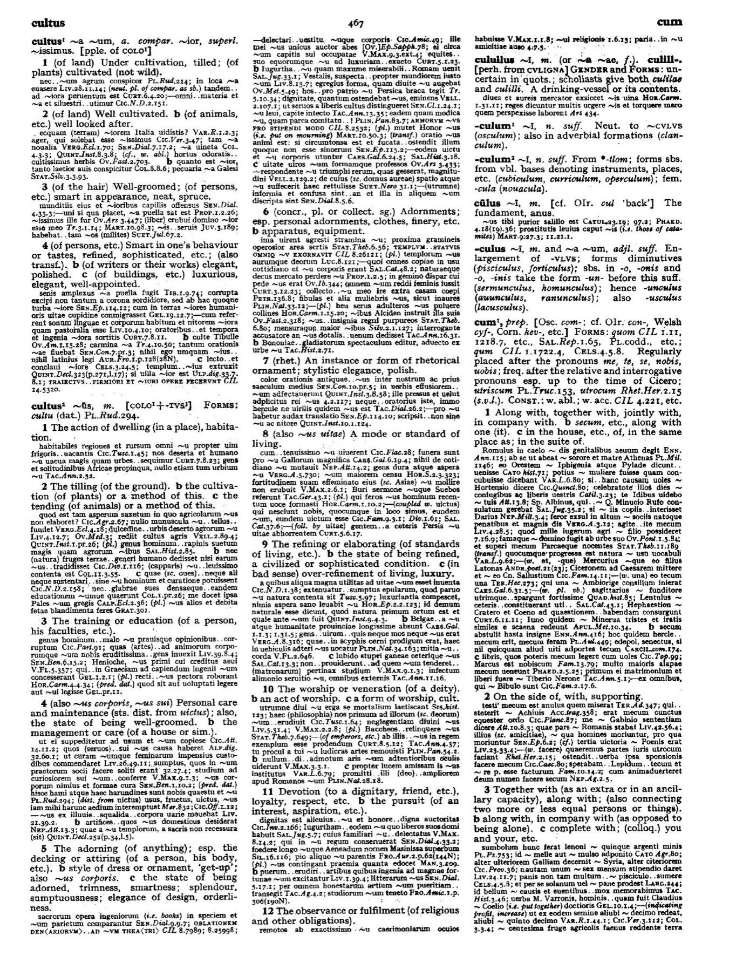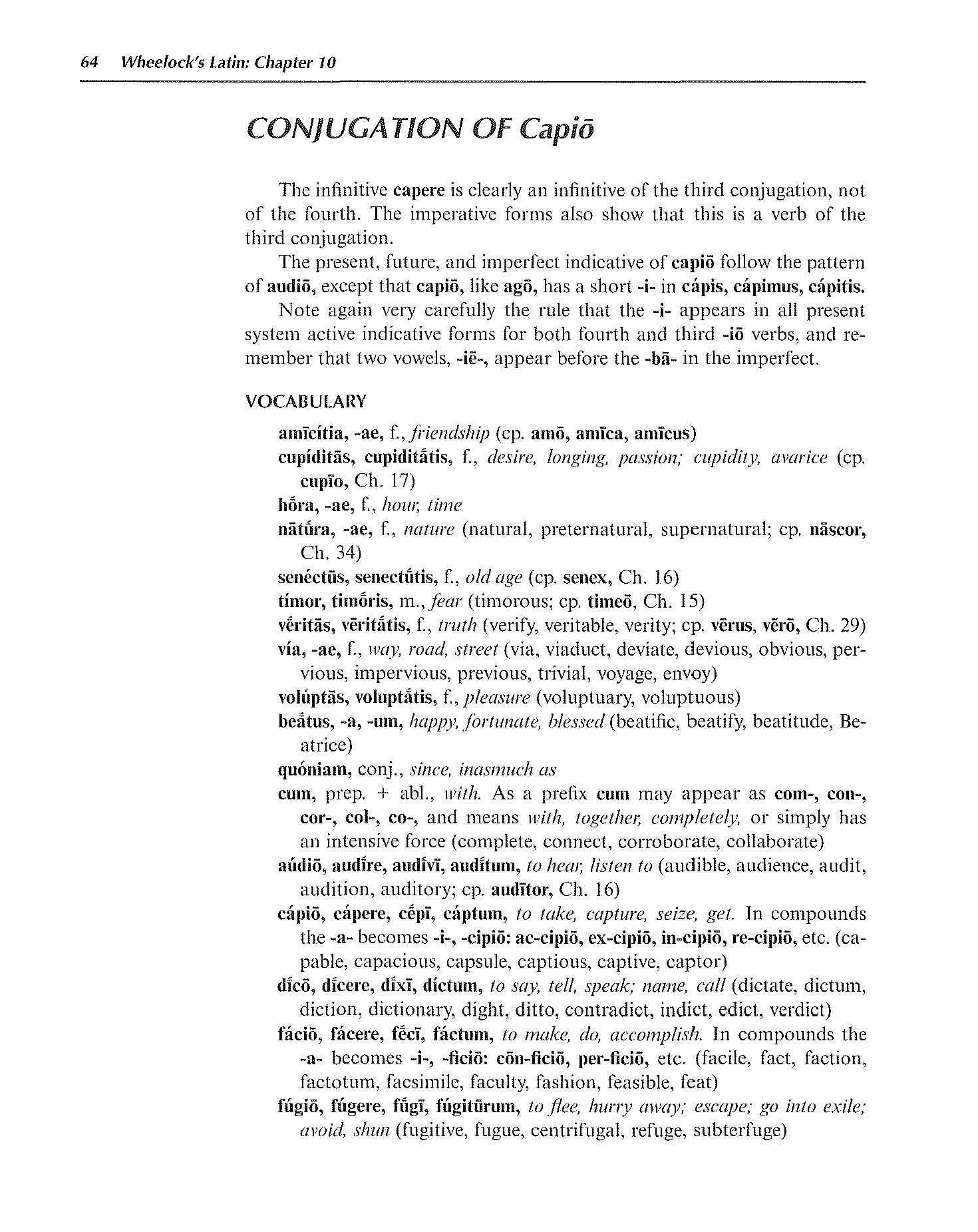
page_listing.tpl
page_subListingDetails.tpl
sub_listingDetails_style1.tpl
sub_listingDetails.title.tpl
cum with
cum is a Latin Preposition that primarily means with.
Definitions for cum
Wheelock's Latin
Preposition
- 1
+abl., with. As a prefix cum may appear as com-, con-, cor-, col-, co-, and means with, together, completely, or simply has an intensive force
English derivatives:
complete connect corroborate collaborate
Oxford Latin Dictionary
Preposition
- 1
Along with, together with, jointly with, in company with. (b) secum, etc., along with one (it). (c) in the house, etc., of, in the same as; in the suite of.
- 2
On the side of, with, supporting.
- 3
Together with (as an extra or in an ancillary capacity), along with; (also connecting two more or less equal persons or things). (b) along with, in company with (as opposed to being alone). (c) complete with; (colloq.) you and your, etc.
- 4
(a) With (forces under one's command), at the head of; also with (subordinates, assistants. etc.). (b) under the command of, with (an officer).
- 5
(after vbs. requiring a combination of objects) With, together with. (b) (in comparisons). (c) (in exchanges).
Sentences with cum
Latin to English
Amōre patriae cum aliīs cīvibus iungimur (iungēbāmur, iungēmur).Compare We are joined (used to be joined, will be joined) to (lit., with) other citizens by love of country.
Rem pūblicam magnā cum cūrā gessit.Compare He managed the state with great care (= very carefully).
Cum lībertātem lēgēsque cōnservāre vērē vellent, tamen scelera tyrannī diūtissimē ferenda erant.Compare Although they truly wanted to preserve their liberty and laws, nevertheless the crimes of the tyrant had to be endured very long.
Arbitrābar eum ex urbe cum decem amīcīs ēgressūrum esse.Compare I kept thinking that he would go out of the city with his ten friends.
Cum ad illum locum vēnerant, tum amīcōs contulerant.Compare Not only had they come to that place, but they also brought their friends. (or When they had come to that place they had brought their friends.)
Venīte cum amīcīs vestrīs.Compare Come (pl.) with your friends.
Data sources
Notes
- Definitions
- Frederick M. Wheelock, Wheelock's Latin, 6th ed., rev. Richard A. LaFleur (New York, NY: HarperCollins Publishers, 2005): 64.
- P. G. W. Glare, Oxford Latin Dictionary, Vols. 1-8 (Oxford: Clarendon Press, 1982): 467.
- Word frequencies
- Christopher Francese, "Latin Core Vocabulary," Dickinson College Commentaries, last modified 2014, http://dcc.dickinson.edu.
- Paul B. Diederich, The Frequency of Latin Words and Their Endings, PhD diss., (Columbia University, 1939).
- Louis Delatte, Suzanne Govaerts, Joseph Denooz, and Etienne Evrard, Dictionnaire fréquentiel et index inverse de la langue latine [Frequency Dictionary and Inverse Index of the Latin Language] (Liège, Belgium: Laboratoire d'analyse statistique des langues anciennes de l'Université de Liège [L.A.S.L.A.], 1981): 119.
Bibliography
Allen, Joseph H. Allen and Greenough's New Latin Grammar for Schools and Colleges: Founded on Comparative Grammar. Edited by James B. Greenough, George L. Kittredge, Albert A. Howard, and Benjamin L. D'Ooge. Boston, MA: Ginn & Company, 1903.
Crystal, David. A Dictionary of Linguistics and Phonetics. 6th ed. Oxford, UK: Blackwell Publishing, 2008.
Delatte, Louis, Suzanne Govaerts, Joseph Denooz, and Etienne Evrard. Dictionnaire fréquentiel et index inverse de la langue latine [Frequency Dictionary and Inverse Index of the Latin Language]. Liège, Belgium: Laboratoire d'analyse statistique des langues anciennes de l'Université de Liège (L.A.S.L.A.), 1981.
Diederich, Paul B. The Frequency of Latin Words and Their Endings. PhD diss., Columbia University, 1939.
Francese, Christopher. "Latin Core Vocabulary." Dickinson College Commentaries. Last modified 2014. http://dcc.dickinson.edu/latin-vocabulary-list.
Gildersleeve, Basil L., and Gonzales Lodge. Gildersleeve's Latin Grammar: Third Edition, Revised, and Enlarged. 3rd ed. London, England: Macmillan and Co., 1903.
Glare, Peter G.W. Oxford Latin Dictionary. Vols. 1-8. Oxford, England: Clarendon Press, 1982.
Krüger, Bernd. "Latin Conjugation Tables." Cactus2000. Accessed May 5, 2023. https://latin.cactus2000.de/index.en.php.
Pierson, Nick. "Sound of Text." Accessed October 26, 2019. https://soundoftext.com.
Wheelock, Frederick M. Wheelock's Latin. 6th ed. Revised by Richard A. LaFleur. New York, NY: HarperCollins Publishers, 2005.
Wiktionary Contributors. "Victionarium." Wikimedia Foundation, Inc. Updated March 18, 2019. https://la.wiktionary.org/wiki/Victionarium:Pagina_prima.
Citation
Chicago (17th ed.)
Allo Contributors. "cum (prep.) - Latin Word Definition." Allo Latin Dictionary. Last modified . Accessed February 11, 2026. http://ancientlanguages.org/latin/dictionary/cum.
Entry created on . Last updated on .








